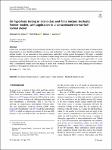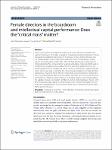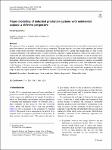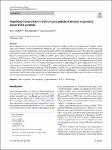Search
Author
- Marina, Dabić (3)
- Christa, Sys (2)
- Domingo, Ribeiro-Soriano (2)
- Gittell, Ross (2)
- next >
Subject
- kinh tế (26)
- Economics (12)
- Management science (7)
- Development Economics (6)
- next >
Date issued
- 2020 - 2023 (306)
- 2010 - 2019 (47)
- 2009 - 2009 (1)
Has File(s)
- true (354)
Search Results
Recent disastrous events, such as the COVID-19 pandemic, has amplified the appeal for compassionate leadership in organizations and is viewed as the need of the hour. While compassion is a timeless concept, there appears to be a lack of clarity around the idea of compassionate leadership, and the current understanding appears limited, fragmented, and scattered across the literature. This integrative systematic review of 41 articles during the last 20 years (2002–2021) conceptualizes six critical dimensions of compassionate leadership, namely: empathy; openness and communication; physical, mental health and well-being; inclusiveness; integrity; respect and dignity. |
Latent class and finite mixture stochastic frontier models have been proposed as a means of allowing either for technological heterogeneity or more flexible distributions of noise and inefficiency. As in the wider literature on latent class and finite mixture models, we are interested in class enumeration, particularly testing against homogeneity. We apply a modified likelihood ratio test for homogeneity in a stochastic frontier setting, based on established results for non-Gaussian latent class and finite mixture models, and provide evidence from Monte Carlo experiments which suggest the applicability of results regarding a modified likelihood ratio test to the stochastic frontier setting. We demonstrate an application to testing a model with a contaminated normal noise term agains... |
Global Value Chains (GVC) have reshaped the landscape of international trade. The quality and intensity of regulation significantly impacts firms' competitiveness and their ability to engage in GVC. Economic literature suggests that regulation of product market competition has a detrimental effect on trade by decreasing productivity, innovation, and economic growth. This paper expands existing knowledge on this relationship by examining the influence of product market regulation (PMR) on value-added trade flows in an augmented gravity model. We constructed a data panel with trade data from 40 OECD and BRICS countries in the period from 2000 to 2015 and combined it with an extensive multi-level indicator set on PMR developed by the OECD. |
Given a set of agents with approval preferences over each other, we study the task of finding k matchings fairly representing everyone’s preferences. To formalize fairness, we apply the concept of proportional representation as studied in approval-based multiwinner elections. To this end, we model the problem as a multiwinner election where the set of candidates consists of matchings of the agents, and agents’ preferences over each other are lifted to preferences over matchings. Due to the exponential number of candidates in such elections, standard algorithms for classical sequential voting rules (such as those proposed by Thiele and Phragmén) are rendered inefficient. |
This research aims to investigate the influence of female directors on Intellectual Capital Performance (ICP) using a sample of manufacturing-listed companies in China. Our study investigates the link between having two or more female directors and the Modified Value-Added Intellectual Coefficient (MVAIC) methodology, employing the critical mass theory from 2004–2017. We find that having a critical mass of female directors (three or more) shows a significant positive impact on MVAIC and its components, including human capital efficiency, structural capital efficiency, relational capital efficiency, and physical capital efficiency, with physical capital being the critical driver. |
The question of how to properly model production systems with unintended outputs has proven both controversial and of particular interest to the productivity and efficiency community. The paper explains why some of the arguments put forward in these controversies are hardly convincing for industrial and other processes. Among other things, there is a lack of clear conceptual labelling of the different types of joint production, especially coupled production, which is the main source of undesirable and other unintended outputs, unless neglected. It is largely ignored that the desirability of such by-products may depend on the quantity produced. |
Open organizations are structures in which members of the public engage in work for the organization. Examples include open-source software, Amnesty International, Wikipedia, and Lego communities. Much research focuses on structural design characteristics of open organizations, such as pre-specified task divisions and integration teams. These practices require the organization to a priori structure in response to its mission. Increasingly, however, open organizations like CrowdDoing and Hyperloop Transportation Technologies (HyperloopTT) require public involvement across volatile, uncertain, complex, ambiguous (VUCA) contexts. |
The phenomenon of fast-growing companies exhibiting sustained growth and creating disproportionally many new jobs, so-called “gazelles”, has been widely analyzed in the literature. The criteria defining “gazelles”, however, lack a consensus, while it cannot be ruled out that superior performance of these companies is just good luck. We use large firm-level datasets for Russia and Spain and conduct a Monte Carlo experiment with first-order Markov chains to derive a definition of “gazelle” companies and ensure that their existence cannot be explained by chance only. |
Managerial Accounting was written around three major themes: Ready, Reinforcement and Relevance. This book is aimed squarely at the new learning styles evident with today's students and addresses accounting industry changes as well. |










